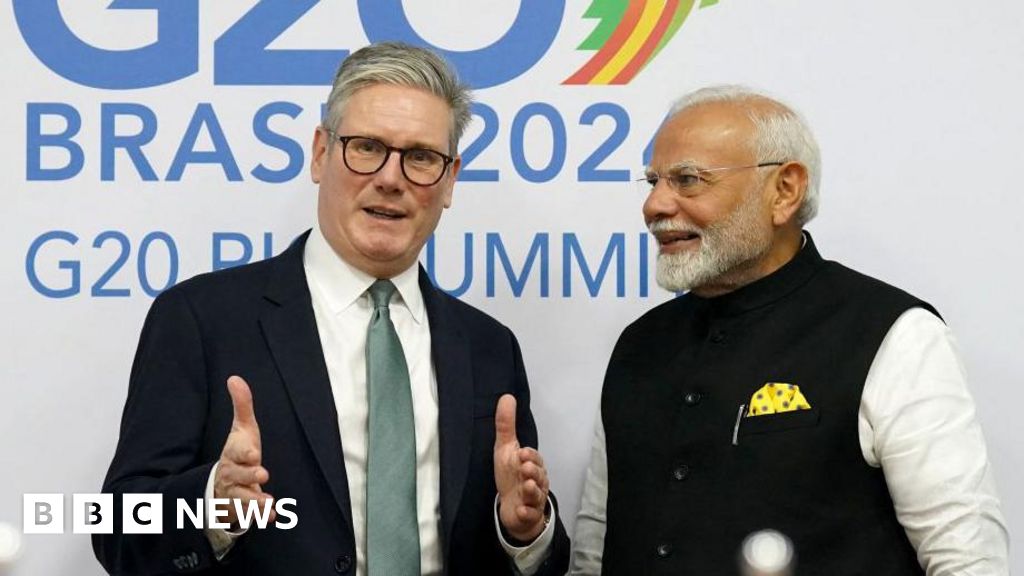Indian Prime Minister Narendra Modi is in the UK to sign a free trade deal expected to lead to a multi-billion pound boost in exports.
UK cars and whisky will be cheaper to export to India and Indian textiles and jewellery cheaper to export to the UK under the agreement, which also commits to a new India-UK plan to tackle illegal migration.
Opponents have warned the deal could undercut British workers due to an extended exemption on national insurance contributions (Nics), from one to three years.
But UK Business Secretary Jonathan Reynolds said this was “completely wrong” and Indian workers on temporary secondment to the UK would get the same deal already offered to 50 other countries.
This means staff from Indian companies who are temporarily transferred to the UK, and staff from UK firms who are temporarily working in India, will only pay social security contributions in their home country, rather than in both places.
When the deal was agreed in May, the Indian government called this “an unprecedented achievement”.
However, the UK government stressed we already have similar reciprocal “double contribution convention” agreements with 17 other countries including the EU, the US and South Korea.
Responding to suggestions the deal meant British workers could be undercut by cheaper Indian workers, Reynolds told BBC Breakfast: “I can categorically tell you that is not the case.
“There is no tax advantage for hiring an Indian worker over a British worker.”
Extra costs for visas and the NHS surcharge would mean “you’d actually pay more for an Indian worker”, he said, adding “no-one is being undercut”.
Speaking ahead of the signing, Sir Keir claimed the deal would create more than 2,200 British jobs across the country as Indian firms expand their operations in the UK and British companies secure new business opportunities in India.
“Our landmark trade deal with India is a major win for Britain,” he said, with new jobs expected to benefit engineers, technicians and supply chain workers in the aerospace, technology and advanced manufacturing sectors.
He added: “We’re putting more money in the pockets of hardworking Brits and helping families with the cost of living, and we’re determined to go further and faster to grow the economy and raise living standards across the UK.”
The UK government says the deal – announced in May after years of negotiations – will boost the British economy by £4.8bn a year.
The agreement was okayed by the Indian cabinet earlier this week but has not yet been agreed by parliament and is expected to take at least a year to come into effect.
The UK already imports £11bn in goods from India but the lower tariffs agreed will make Indian exports cheaper, including for components used in advanced manufacturing.
Indian manufacturers are also expected to gain access to the UK market for electric and hybrid vehicles.
Average tariffs for UK exports to India will drop from 15% to 3%, making it easier for British companies to sell goods in India.
Whisky tariffs for exports to India have been slashed in half, from 150% to 75%, giving the UK an immediate advantage over international competitors in reaching the Indian market, and the tariff will drop to 40% by 2035.
The two prime ministers have also agreed on closer collaboration around defence, education, climate, technology and innovation.
Enhanced intelligence sharing and operational collaboration will also assist in tackling corruption, serious fraud, organised crime, and irregular migration.
This includes finalising a new sharing agreement for criminal records, which will assist court proceedings, help maintain accurate watchlists, and enable the enforcement of travel bans.
The deal has not given the UK as much access as it would have liked to India’s financial and legal services industries, and talks continue on a bilateral investment treaty aimed at protecting British investments in India and vice versa.
The two nations also continue to discuss UK plans for a tax on high-carbon industries, which India believes could hit its imports unfairly.
Today’s visit is Modi’s fourth to the UK since he became India’s prime minister in 2014.
The latest deal comes a year after the UK-India Technology Security Initiative was signed by Modi and Foreign Secretary David Lammy, allowing joint work on telecoms security and emerging technologies.
Negotiations on the trade deal have taken three years, having been started by former PM Boris Johnson in 2022.
Conservative shadow business secretary Andrew Griffith claimed the trade deal had only been made possible “because of Brexit delivered by the Conservatives” and was “a step in the right direction”.
But he added: “The irony should not be lost on anyone that any gains from this trade deal will be blown out of the water by [Deputy Prime Minister] Angela Rayner’s union charter, stifling business with red tape, the jobs tax and, come autumn, Rachel Reeves’ inevitable tax hikes that will punish Britain’s makers just to reward those who do not contribute.”


